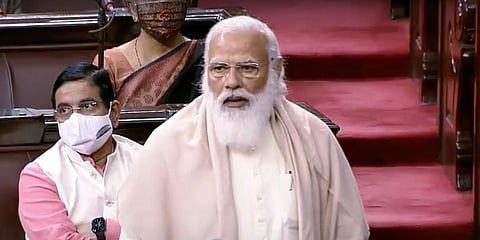

Our Prime Minister cried in Parliament the other day. No, his face didn't go into contortions of grief and the body did not shake with sobbing. His was a dignified crying that could be managed with a quick flashing of the thumb under the eyeglass and a sip of water. The sight of a democratically elected leader succumbing to emotions of the ordinary kind must have attracted widespread sympathy from those who watched the scene on TV.
What made him cry? People must have thought that he was grieving over the death of more than 200 farmers who died in the course of their Long March protest. Or, they thought he was upset that responsible citizens like Sudha Bharadwaj and Stan Swamy were still in prison for no offence other than expressing opinions different from the Government's. But we learned in due course that our Prime Minister turned teary-eyed not for reasons lay citizens thought possible.
He cried because Ghulam Nabi Azad was retiring from Parliament. This made no sense. Retiring from Parliament is a routine. And Azad is not even a BJP man. Why should the country's most important BJP leader cry when a Congressman leaves the Rajya Sabha?
Obviously, it is theatrics. But who is it meant to fool? Azad must have been pleased, of course. He made the kind of statement politicians do. "We understand some people superficially and some in depth. Those who understand me in depth and saw my work over the years became emotional yesterday. I am thankful to everyone," he said.
So, Modiji understood Azadji in depth and all is well with the world. Shashi Tharoor had the best comment on Modi's emotional farewell. "Artfully crafted performance," he said. He recalled farmers' leader Rakesh Tikait breaking down recently and said: "It was partly in response to Tikait’s tears that the PM decided he also has tears."
Political leaders crying in the open always attract headlines. That, too, must have weighed with Modi, a master in the art of public relations. He would have known how tears have influenced history. Winston Churchill famously cried in Parliament, not once but many times until Edward VIII called him a "cry baby".
Jawaharlal Nehru turned teary-eyed while listening to Lata Mangeshkar’s rendering of 'Aye mere Watan Ke Logon' on Republic Day in 1963. Donald Trump represented the other side of the spectrum; he said crying by men was a sign of weakness.
Remember he made his millions in real estate business, a cut-throat field. Modi is known for his love of theatrics. Punjab CM Amarinder Singh called him "a self-obsessed man interested only in publicity; all his actions are aimed at that". But even his bitterest critic must agree that he is a master of the art of publicity.
He knows how to seize the moment and leave his imprint on it. The absence of an effective opposition in India is no doubt the main reason for the BJP's success. The Congress is in no position to challenge the BJP because the Congress has become a mere extension of Rahul Gandhi, who turns into a national leader only when he is in the right mood.
Where is BJP with its cadre base and where is Congress with its time servers? Rahul Gandhi is either unable or unwilling to see the negative impact of his on-again, off-again kind of leadership. He doesn't lose, but his party does.
The call for internal elections has been strong in the Congress lately. Officially, they have also fixed a time frame for such an election. But no one seems to have been impressed. If Rahul Gandhi is a candidate for the president's post, will there be another candidate? How credible will be the election even if a 'naam-ke-wastay' candidate is put up against him? The reality is that inner-party democracy is not only nonexistent in the Congress; it is not possible because of the Gandhi family's overwhelming status in the party.
The political scenario in India is not going to change in the foreseeable future. It will be a two-party system, with one party strong in its internal structure as well as leadership, and the other party losing its identity into the identity of a single family. The BJP is lucky. The Congress is unlucky. India? Well, India is unlucky. It can only cry.